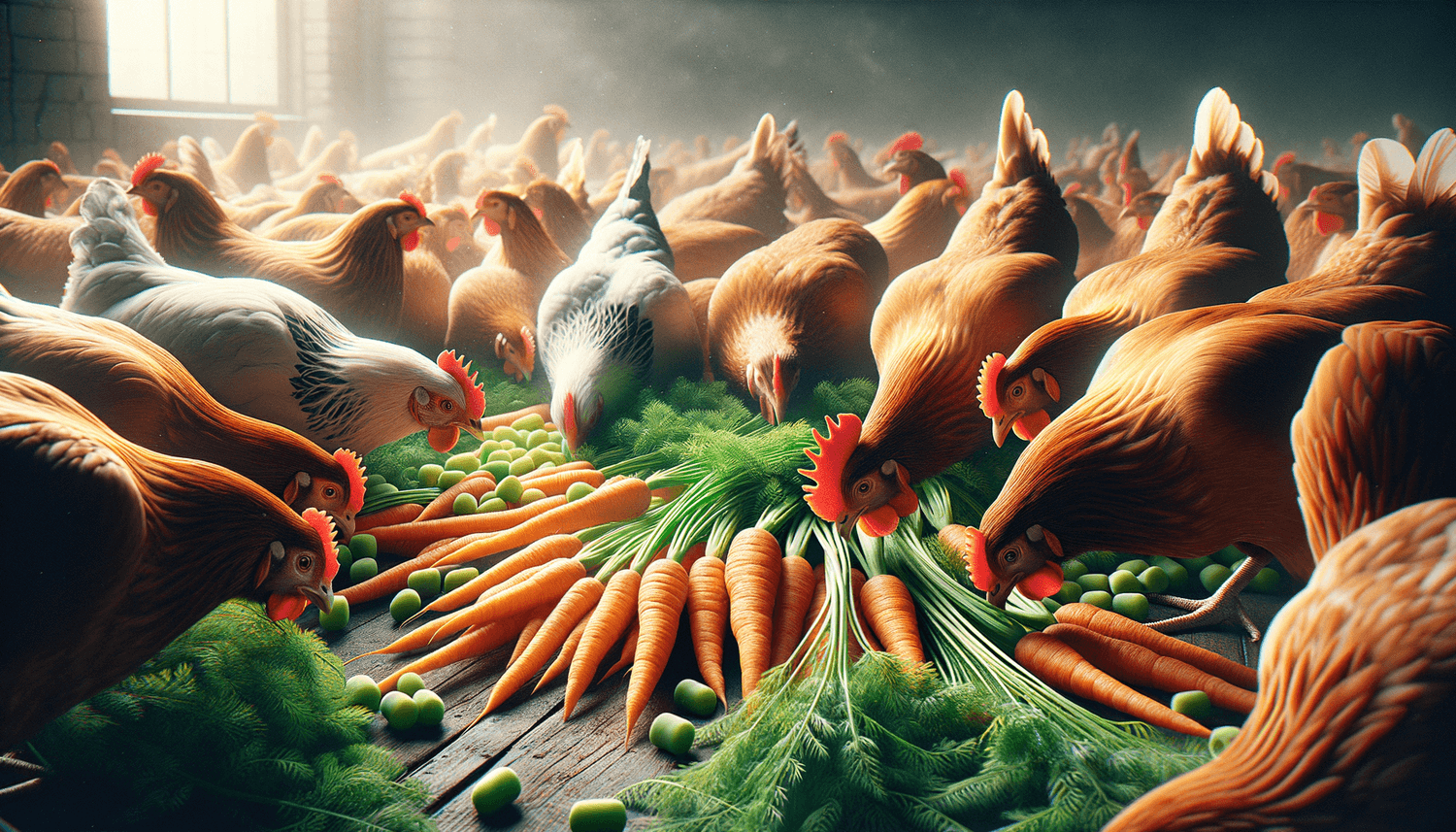Do you ever find yourself knee-deep in kitchen scraps, wondering whether to add those vibrant carrot tops to the backyard chicken feast of the day? Fear not, dear reader! In this fun and feathery blog post, we’ll tackle the great carrot top conundrum, uncovering whether these leafy greens get a clucky thumbs-up or a feathery flap-down. Hop on board as we explore the importance of a balanced diet, the nutritional value of these tasty treats, and how to prepare the perfect carrot top nibble for your ever-peckish chickens. Let’s hatch some knowledge together!
Can chickens eat carrot tops?
Yes, chickens can safely eat carrot tops! These leafy greens make an excellent treat for your backyard flock. Carrot tops are packed with nutrients and not only provide a healthy option for your chickens’ diet, but also offer some variety to keep them happy and satisfied.
A balanced diet for clucky companions
Just like their human caretakers, chickens thrive on a well-balanced diet that meets their nutritional needs. A chicken’s diet should primarily consist of a high-quality chicken feed, which ensures they receive the appropriate nutrients, including proteins, vitamins, and minerals. Chicken feed should make up around 80-90% of their diet, providing the essential nutrients required for their overall health, egg production, and growth.
Now, let’s talk about the remaining 10-20% of our feathered friends’ diet. This portion can be composed of a variety of treats, such as fruits and vegetables, to keep things interesting and offer some additional benefits. When it comes to treats, moderation is key; we don’t want our chickens to be picky eaters, choosing delightful snacks over their chicken feed! A well-crafted combination of high-quality chicken feed and nutritious treats will keep your backyard flock clucking contentedly.
Nutritional value of carrot tops for chickens.
Feeding carrot tops to chickens not only provides variety for your flock, but also delivers an array of nutritional benefits. Carrot tops are high in vitamins and minerals that contribute to the overall health and well-being of your chickens. These leafy greens are packed with vitamins A, B6, C, and K, which support a healthy immune system, promote strong bones, and help maintain proper blood clotting.
In addition to their rich vitamin content, carrot tops contain essential minerals such as potassium, calcium, and manganese. These minerals play critical roles in body functions like muscle contractions, nerve signaling, and strong eggshell production. Moreover, including carrot tops in their diet contributes to their hydration as these greens have a high water content. This hydration boost is especially valuable during hot summer days, when chickens may struggle to retain adequate moisture levels.
To summarize, carrot tops offer noteworthy nutritional value to chickens when fed in moderation as a treat. The vitamins, minerals, and hydration properties found in these leafy greens make them an appetizing and beneficial snack for your backyard birds.
Nutrition table of carrot tops for chickens.
| Information | Description |
|---|---|
| Nutritional Value | Rich in vitamins A, B6, C, and K, as well as minerals such as potassium, calcium, and manganese |
| Suggested Serving Size | Small handful per chicken as a treat, not to exceed more than 10-20% of their total diet |
| Safe Feeding Practices | Feed in moderation, ensuring that high-quality chicken feed makes up 80-90% of their diet |
| Preparation | Rinse and chop into smaller pieces for easy consumption |
| Potential Risks | Minimal risks when fed in moderation; overfeeding can cause an imbalanced diet |
| Hydration | High water content in carrot tops promotes hydration, beneficial especially during hot weather |
| Digestion | Fiber content in carrot tops aids in healthy digestion |
| Seasonal Availability | Carrot tops are most plentiful during the summer and early fall months |
| Other Benefits | Adding variety to diet, supporting the immune system, and promoting strong bones |
Feeding carrot tops safely
While carrot tops are indeed a nutritious and safe treat for chickens, it’s important to follow safe feeding practices to prevent any potential issues. Always ensure the carrot tops are clean; rinse them thoroughly to remove any dirt or pesticides that could be harmful to your chickens. Chopping the carrot tops into smaller pieces can make it easier for your flock to consume.
Where to source carrot tops
Carrot tops can be sourced from various locations, such as your own garden, farmers’ markets, or grocery stores. If you’re growing carrots yourself, remember to use organic gardening methods to ensure the safety and health of your chicken flock. When purchasing from farmers’ markets or grocery stores, prefer organic sources if possible, and always wash thoroughly before feeding.
Combining carrot tops with other treats
Carrot tops can be combined with other leafy greens, fruits, or vegetables to create a diverse and delicious treat for your chickens. Some options include spinach, kale, and collard greens, or fruits like apples and berries. Mixing various treats can make the snack more appealing and increase the range of nutrients your chickens consume.
Recycle your carrot tops in the coop
If you find yourself with an abundance of carrot tops, feel free to freeze them for later use. This can come in handy during winter months when fresh produce is scarcer. Alternatively, you can also toss them into the chicken coop as a source of “green” material to aid in creating nutrient-rich compost. The high nitrogen content in carrot tops can be beneficial to maintain a healthy coop environment and produce great compost for your garden.
Armed with this newfound knowledge, feel free to add those bright and nutritious carrot tops to your chickens’ snack rotation. They’re not only healthy and delicious, but they also serve as a fun treat for your backyard flock!

















